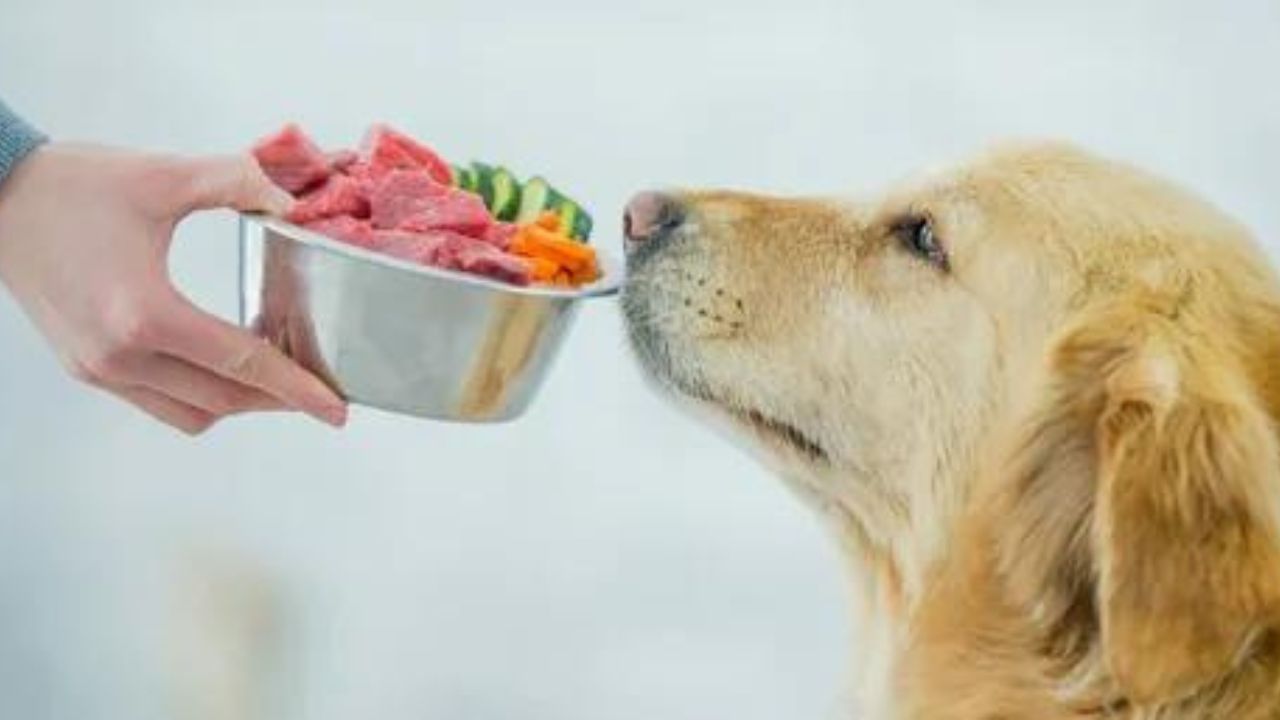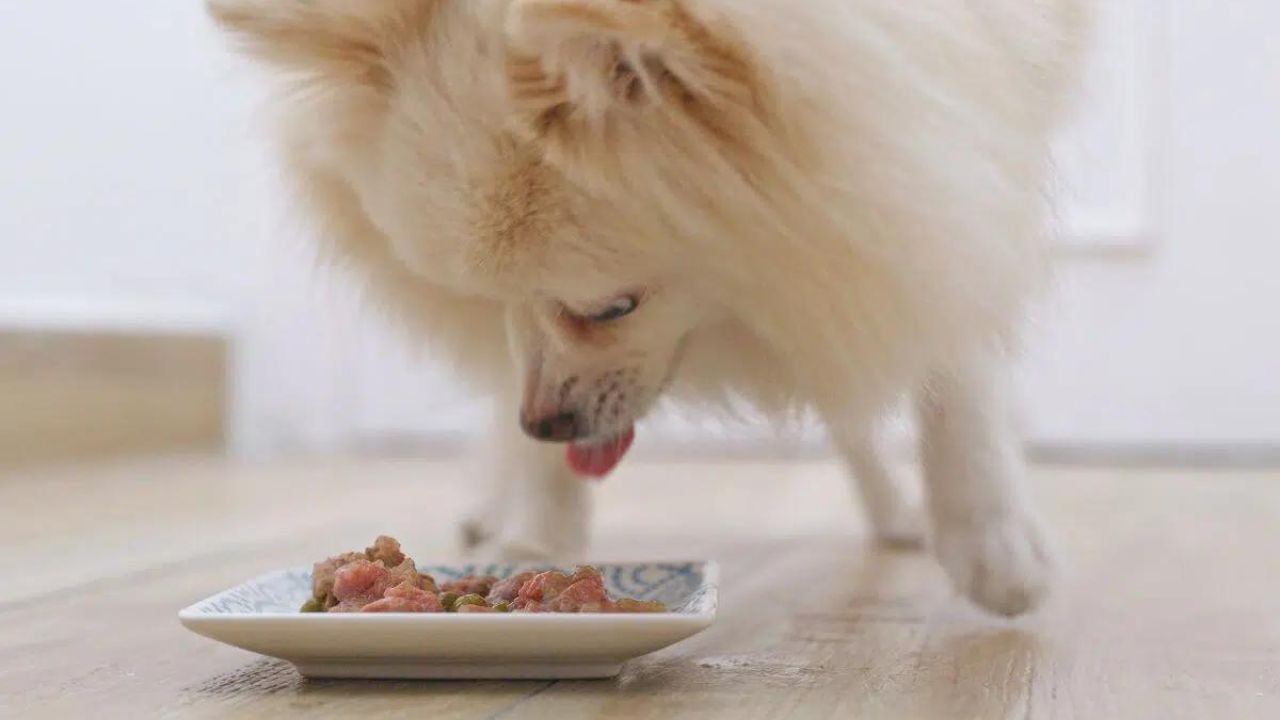As a dog owner, you want to provide the best nutrition for your furry friend. One question often arises is whether feeding a Pomeranian raw meat is safe and beneficial. This article will explore the topic and provide valuable information to help you decide about feeding your Pomeranian raw meat.
The American Veterinary Medical Association advises against giving raw meat to your dog since it lacks the balanced nutrition your canine friend requires in their diet. Eating raw meat regularly can increase the risk of nutritional deficiencies.
A Pomeranian’s Nutritional Needs

Before delving into the topic of feeding raw meat to your Pomeranian, it’s essential to understand their nutritional needs. Pomeranians are small breed dogs that require a well-balanced diet to thrive. Their diet should consist of high-quality animal-based protein sources, including beef, chicken, turkey, lamb, duck, eggs, and more.
The Raw Food Diet for Pomeranians
Feeding dogs a raw food diet has gained popularity in recent years. Proponents believe this diet closely resembles what dogs would eat in the wild. However, opinions are divided when it comes to feeding Pomeranians a raw diet.
Benefits of Feeding Raw Meat
Can I Feed My Pomeranian Raw Meat Advocates of the raw food diet for dogs argue that it offers several benefits. Some of the potential advantages of feeding raw meat to your Pomeranian include:
- Improved digestion: Raw meat contains natural enzymes that can aid in the digestion process.
- Healthy coat and skin: A raw food diet may contribute to a shiny coat and healthier skin.
- Increased energy levels: Some owners report that their Pomeranians have increased and improved overall vitality when fed a raw food diet.
Potential Risks of Feeding Raw Meat
While there are potential benefits to feeding raw meat, it’s important to consider the risks as well. Some of the potential risks associated with a raw food diet for Pomeranians include:
Bacterial contamination: Raw meat can be a source of harmful bacteria such as Salmonella or E. coli, posing a risk to both your dog’s health and your own.
Nutritional imbalances: Without proper planning and supplementation, a raw food diet may lack essential nutrients, leading to nutritional imbalances.
Choking hazards: Feeding large chunks of raw meat can be choking, especially for smaller dogs like Pomeranians.
What Are the Benefits of Raw Dog Food?
Can I Feed My Pomeranian Raw Meat The primary motivation for feeding a Pomeranian raw food diet to their dog is to replace highly processed canned foods and kibble with healthier, handmade, all-natural foods.
There are numerous advantages to raw feeding for dogs, including:
• Improved digestion.
• Cleaner teeth and better breath.
• Better weight management.
• Stools have a milder odor and are smaller and firmer.
• Improved bowel, pancreatic, and liver health.
• Coat and skin are shinier and healthier.
• Increased endurance and vigour.
• Older dogs have more mobility.
• Allergic symptoms have been reduced.
• Improved immune system.
• Saving money because fewer vet visits are anticipated.
Can dogs eat raw meat?
Yes, dogs can eat raw meat technically, but it doesn’t mean they should.
Animals, particularly wild ones, have a greater stomach acid, which aids digestion and kills parasites and bacteria in raw meat, according to Soma Technology. Before domestication, dogs, like most other animals, ate raw meat.
Is raw meat good for dogs?
The American Veterinary Medical Association cautions against feeding your dog raw meat because it doesn’t provide the balanced nutrition your canine companion needs in their diet.
Eating raw meat regularly can increase the risk of nutritional deficiencies. A 2011 study from Cambridge University found that 60{d43541ac5258a2a3f82a5103d24d174f61cb330182a67a2d87343fba784ffa42} of dogs on a diet of bones and raw food had nutritional imbalances.
Can I feed my dog a raw food diet?

Most veterinarians advise against giving dogs raw diets because humans don’t eat raw meat — there are health risks regarding the bacteria in raw food. The Centers for Disease Control and Prevention warn pet owners about raw diets because of bacteria like salmonella and listeria, which can be found in raw pet food, even packaged meats in stores.
According to a study from the University of California, Davis, there is little to no scientific support in favour of the raw diet. Research suggests canned diets, kibble, and home-cooked meals benefit your pet’s nutritional intake. In this case, the risks far outweigh any potential benefits of a raw meat diet.
Raw food diets can also harm dog owners and their families. You could be subject to food poisoning or sickness by just handling raw food or caring for your pet.
Expert Opinions and Recommendations
When feeding raw meat to Pomeranians, it’s always wise to consult with professionals, including veterinarians and canine nutritionists. These experts can provide personalized advice based on your Pomeranian’s needs and health condition.
The American Veterinary Medical Association (AVMA) and the U.S. Food and Drug Administration (FDA) advise against feeding dogs raw meat. They raise concerns about bacterial contamination and the potential risks associated with an unbalanced diet.
Transitioning to a Raw Food Diet
Can I Feed My Pomeranian Raw Meat If you decide to feed your Pomeranian a raw food diet, it is important to transition them gradually. Abrupt changes in diet can cause gastrointestinal upset. Start by introducing small amounts of raw meat into their regular meals and gradually increase the proportion over time. Monitor your Pomeranian’s digestion and overall well-being during this transition period.
Types of Raw Meat to Feed
When selecting raw meat for your Pomeranian, choosing high-quality, human-grade sources is essential. Lean meats such as chicken, turkey, beef, or lamb are good options. It is also advisable to include organ meats like liver and heart, which provide essential nutrients.
Remember to avoid seasoned or processed meats as they may contain harmful additives such as spices, sodium, or preservatives that can harm your dog’s health. Be cautious about giving them bones, as certain types can splinter, pose a choking hazard, or cause gastrointestinal blockages. Always consult your veterinarian for recommendations on suitable bone options.
The Importance of Balance and Variety
Providing a balanced raw food diet for your Pomeranian is crucial. A well-planned raw food diet should consist of muscle meat, organs, bones (if appropriate), and a small amount of vegetables or fruit. The aim is to mimic a natural prey-based diet, ensuring your Pomeranian receives all the necessary nutrients.
Consulting with a canine nutritionist or veterinarian specializing in raw feeding can help you create a balanced and species-appropriate diet for your Pomeranian. They can also guide you on the correct portion sizes based on your dog’s age, weight, and activity level.
Safe Handling and Preparation
Handling raw meat safely is essential for your Pomeranian’s health and the well-being of your entire household. Follow these guidelines to ensure safe handling and preparation:
- Wash your hands thoroughly before and after handling raw meat.
- Keep raw meat separate from other food items to avoid cross-contamination.
- Store raw meat in sealed containers in the refrigerator or freezer to prevent bacterial growth.
- Thaw frozen meat in the refrigerator or using the defrost setting on your microwave, avoiding leaving it at room temperature for long periods.
- Clean and sanitize all surfaces, utensils, and bowls that come into contact with raw meat.
Monitoring Your Pomeranian’s Health
Once you have transitioned your Pomeranian to a raw food diet, closely monitoring their health and well-being is important. Look for signs of any adverse reactions, such as digestive upset, allergies, or changes in behaviour. Consult your veterinarian and schedule routine check-ups to ensure your Pomeranian remains healthy.
Benefits of a Raw Food Diet
Advocates of a raw food diet for dogs often highlight the following potential benefits:
- Improved dental health: Chewing raw meat and bones can help maintain strong teeth and gums.
- Reduced allergies: Some owners claim that switching to a raw food diet has alleviated their dog’s allergies or sensitivities.
- Weight management: A properly balanced raw food diet can help manage weight in overweight or obese Pomeranians.
Supplements for a Raw Food Diet
Can I Feed My Pomeranian Raw Meat Ensuring your Pomeranian receives all the necessary nutrients while on a raw diet may require supplementation. Some commonly recommended supplements include:
- Omega-3 fatty acids: These can be obtained from fish oil or other marine sources and help support a healthy coat, skin, and immune system.
- Probiotics: Adding probiotics to your Pomeranian’s diet can promote a healthy gut microbiome and aid digestion.
- Calcium: Since raw meat diets usually lack bone content, calcium supplementation is often necessary. Consult your veterinarian for appropriate calcium sources and dosage.
Monitoring Stool Quality
Monitoring your Pomeranian’s stool quality is important when transitioning to a raw food diet. Healthy stools should be firm and well-formed. Loose stools or diarrhoea may indicate an imbalance in the diet or a sensitivity to certain ingredients. If you notice any persistent digestive issues, consult with your veterinarian.
Age and Health Considerations
The suitability of a raw food diet may vary based on factors such as your Pomeranian’s age and overall health. Puppies have different nutritional requirements than adult dogs and senior dogs may have specific dietary needs. Dogs with certain health conditions, such as pancreatic issues or compromised immune systems, may require a different approach to their diet. Consult your veterinarian to determine the best course of action based on your Pomeranian’s circumstances.
Commercial Raw Food Options
Can I Feed My Pomeranian Raw Meat If you’re considering a raw food diet for your Pomeranian but prefer a convenient option, there are commercially available raw dog food options. These products are formulated to provide a balanced diet, eliminating the need for DIY meal preparation. Look for reputable brands that use high-quality ingredients and meet nutritional standards.
Conclusion
Feeding raw meat to your Pomeranian is a decision that should be carefully considered. While there are potential benefits to a raw food diet, it also carries risks. It’s crucial to consult with professionals, gather information, and make an informed choice, considering your dog’s health, nutritional requirements, and personal circumstances.
FAQ
What is a Raw Food Diet for Pomeranian Dogs?
A raw diet for Pomeranian dogs is healthier than a kibble diet. As a Pomeranian is a small, artificial dog, modifications are required to most raw food dog diets to suit a Pom dog better. A raw dog food diet generally contains a mixture of any of these foods: Muscle meat (which can be left on the bone). Ground or whole bones.
Can Pomeranians Eat Pork?
Pomeranians can eat pork if it’s cooked plainly without sauce or seasoning. You should avoid giving your dog undercooked or raw pork, which might infect them with bacteria and make them ill. Furthermore, your dog should never be given processed pig products like ham and bacon.
Can Pomeranians Chew Raw Bones?
Pomeranians can nibble on raw bones. Bones are high in minerals and nutrients that are beneficial to your dog. Raw bones are also known to keep their teeth clean. However, several vets oppose feeding dogs bones since it may create major health problems.
How Much Should I Feed my Pomeranians?
Most adult Poms should eat approximately 2 – 4{d43541ac5258a2a3f82a5103d24d174f61cb330182a67a2d87343fba784ffa42} of their body weight daily. That’s the correct amount for Pomeranians. Other dogs may have different percentages. Pom puppies may need up to 10{d43541ac5258a2a3f82a5103d24d174f61cb330182a67a2d87343fba784ffa42} of their body weight daily while growing. The recommended amount of food is calculated on the dog’s weight, age and activity levels.

